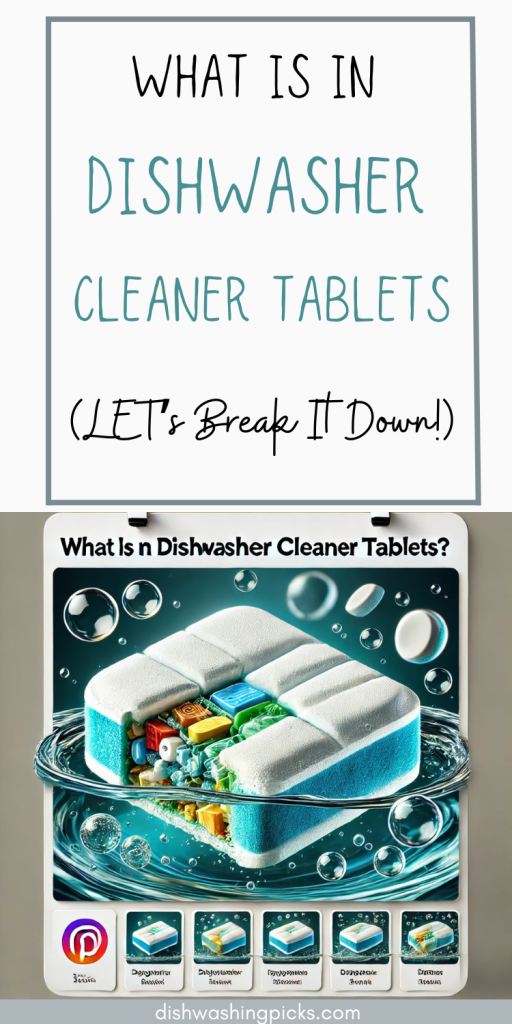
Ever dropped one of those little tablets into your dishwasher and wondered, what is this thing actually made of? It fizzes, it foams, and somehow, your dishwasher comes out looking (and smelling) fresh. But what’s going on behind the scenes?
Let’s take a peek inside these mysterious cleaning pods.
The Key Ingredients: Magic or Just Chemistry?
Most dishwasher cleaner tablets contain a mix of powerful ingredients designed to break down grease, remove hard water buildup, and kill bacteria. Here’s what’s actually in them:
🔹 Citric Acid – The superstar ingredient! It dissolves mineral deposits, fights limescale, and helps remove stubborn food residue. Ever tried using lemon juice to clean? Same idea—just stronger.
🔹 Sodium Carbonate (Washing Soda) – This boosts the cleaning power by softening water and helping break down grease. It’s also great for neutralizing odors.
🔹 Enzymes – These little workers break down proteins, starches, and fats, making it easier for water to wash them away. They’re like microscopic Pac-Man, munching away at leftover food bits.
🔹 Surfactants – These are the grease-cutting agents that help lift dirt and grime from your dishwasher’s walls, racks, and spray arms. Think of them as the bouncers kicking out stubborn gunk.
🔹 Bleaching Agents (Sometimes) – Some tablets contain oxygen-based bleach, which helps sanitize and brighten stainless steel interiors. Don’t worry, this isn’t the harsh chlorine bleach you use on laundry—it’s a gentler, dishwasher-safe version.
🔹 Fragrances (Optional) – Ever wonder why your dishwasher smells like “lemon burst” or “fresh rain” after cleaning? That’s artificial fragrance doing its job. It’s not necessary for cleaning, but it sure beats the smell of old food and mildew.
Are Dishwasher Cleaner Tablets Actually Necessary?
Alright, so now we know what’s inside those little fizzing tablets. But here’s the million-dollar question—do you really need them, or is this just another clever marketing ploy?
Let’s be honest. Dishwashers are designed to clean dishes, not themselves. And while they do a pretty good job of rinsing away leftover food, grease, and detergent, over time, things start to build up—think limescale, soap scum, and that weird musty smell that makes you question whether your plates are really clean.
So, do you have to use a special cleaner? Not necessarily. But will it keep your dishwasher running better and smelling fresher? Absolutely.
What Happens If You Never Clean Your Dishwasher?
Imagine never cleaning your shower. The water would still technically rinse off the soap, but over time, you’d get nasty buildup, mildew, and grime that no one wants to deal with. The same thing happens inside your dishwasher.
Here’s what can go wrong if you skip the cleaning step:
⚠️ Clogged Spray Arms – Hard water deposits and grease can block those tiny holes, meaning your dishes don’t get properly cleaned.
⚠️ Funky Smells – Trapped food particles and bacteria can make your dishwasher (and your kitchen) smell questionable.
⚠️ Residue on Dishes – Ever pulled out a supposedly “clean” glass only to find a filmy layer on it? That’s likely from detergent and mineral buildup.
⚠️ Shortened Lifespan – Just like any appliance, a neglected dishwasher has to work harder to function, which can lead to breakdowns.
So yes, while it might seem like a dishwasher cleaning tablet is just another unnecessary product, it does help keep things running smoothly.
But wait—what if you don’t want to spend money on store-bought cleaners? That’s where DIY hacks come in.
DIY Dishwasher Cleaning: Do Pantry Staples Work Just as Well?
Good news—you don’t need to buy fancy tablets if you prefer a more budget-friendly (or natural) approach. Some of the same ingredients found in dishwasher cleaners are probably already sitting in your pantry!
Here’s how you can clean your dishwasher using simple household staples:
✅ White Vinegar – A natural degreaser and descaler, vinegar helps break down hard water buildup and odors. Just place a cup of vinegar on the top rack and run a hot cycle.
✅ Baking Soda – Sprinkle a cup on the bottom of the dishwasher and run a short cycle. This helps neutralize odors and scrub away grime.
✅ Lemon Juice – Similar to citric acid, lemon juice fights limescale and leaves a fresh scent. Add a few tablespoons to your vinegar rinse for extra cleaning power.
✅ Hydrogen Peroxide – Want some antibacterial action? Add a little hydrogen peroxide to your cleaning cycle to kill germs and freshen things up.
So, does DIY work? Yes—but not always as well as a concentrated cleaner. If you clean your dishwasher regularly, these hacks are great for maintenance. But if you’re dealing with serious buildup, a dedicated cleaner might be the better option.
Final Verdict: To Buy or DIY?
Here’s the bottom line:
💰 If you want a hassle-free, deep clean → Use a commercial dishwasher cleaner tablet once a month.
🥒 If you prefer a natural, budget-friendly option → Use vinegar and baking soda regularly.
⚠️ If you do nothing → Be prepared for smells, clogs, and a less effective dishwasher over time.
So, do you really need dishwasher cleaner tablets? No, but they sure make life easier.
